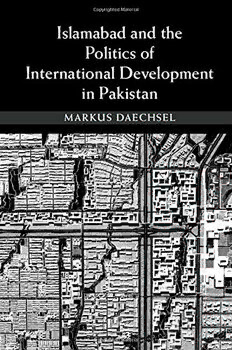
Islamabad and the Politics of International Development in Pakistan PDF
Preview Islamabad and the Politics of International Development in Pakistan
Islamabad and the Politics of International Development in Pakistan This is a highly original account of the design and development of Pakistan’s capital city: one of the most iconic and ambitious urban reconstruction projects of the twentieth century. Balancing archival research with fresh, theoretical insights, Markus Daechsel surveys the successes and failures of Greek urbanist Constantinos A. Doxiadis’s most ambitious endeavour, Islamabad, analysing how the project not only changed the international order, but also the way in which the Pakistani state operated in the 1950s and 1960s. In dissecting Doxia- dis’sfraughtrelationshipwithPakistanipolicymakers,bureaucratsand ordinarycitizens,thebookoffersanunprecedentedaccountofIslama- bad’s place in post-war international development. Daechsel provides newinsightsintothisperiodandexploresthehistoryofdevelopmentas a charged, transnational encounter between foreign consultants and donorsontheoneside,andthepost-colonialnationstateontheother. markus daechsel isSeniorLecturerinModernSouthAsianHistory atRoyalHolloway,UniversityofLondon. Islamabad and the Politics of International Development in Pakistan Markus Daechsel UniversityPrintingHouse,CambridgeCB28BS,UnitedKingdom CambridgeUniversityPressispartoftheUniversityofCambridge. ItfurtherstheUniversity’smissionbydisseminatingknowledgeinthepursuitof education,learningandresearchatthehighestinternationallevelsofexcellence. www.cambridge.org Informationonthistitle:www.cambridge.org/9781107057173 ©MarkusDaechsel2015 Thispublicationisincopyright.Subjecttostatutoryexception andtotheprovisionsofrelevantcollectivelicensingagreements, noreproductionofanypartmaytakeplacewithoutthewritten permissionofCambridgeUniversityPress. Firstpublished2015 PrintedintheUnitedKingdombyClays,StIvesplc AcataloguerecordforthispublicationisavailablefromtheBritishLibrary LibraryofCongressCataloguinginPublicationdata Daechsel,Markus. IslamabadandthepoliticsofinternationaldevelopmentinPakistan/Markus Daechsel. pages cm.– (Studiesininternationalplanninghistory) Includesbibliographicalreferences. ISBN978-1-107-05717-3(Hardback) 1. Cityplanning–Politicalaspects–Pakistan–Islamabad. 2. Economic development–Politicalaspects–Pakistan. 3. Economicassistance–Political aspects–Pakistan. 4. Islamabad(Pakistan)–History–20thcentury.- I. Title. HT169.P32I8153 2015 307.1021609549149–dc23 2014039490 ISBN978-1-107-05717-3Hardback CambridgeUniversityPresshasnoresponsibilityforthepersistenceoraccuracyof URLsforexternalorthird-partyinternetwebsitesreferredtointhispublication, anddoesnotguaranteethatanycontentonsuchwebsitesis,orwillremain, accurateorappropriate. Contents List of figures page vi Acknowledgements viii Introduction 1 1 Architect ofdevelopment 31 2 Theconsultant’s gaze 67 3 From ‘great plan’to great project 106 4 On the road to Islamabad 148 5 Planning the Muslim city of the future 193 6 Theconsultant under attack 243 Conclusion 289 Bibliography 300 Index 313 v Figures 1 Iraq housingprogram. page43 2 Doxiadis at his desk in his office at DAheadquarters,Athens. 44 3 Aerialtopography sketched and interpreted byDoxiadis. 89 4 Aerialsurveying –photograph taken on acommercial flight over East Pakistan. 90 5 Doxiadis captures thecrowds awaiting his arrival by amphibious biplane in Rajshahi, East Pakistan. 91 6 Street viewof the WalledCity ofLahore, West Pakistan, autumn 1954. 94 7 Photograph taken during one ofDoxiadis’s surveys of vernacular building styles in Rajshahi,East Pakistan. 95 8 Rapid surveying – snapshotof mud houses in south-western Punjab. 96 9 Ministerfor RefugeeRehabilitation (and later Governor of East Pakistan), General Azam Khan, meets Doxiadis at DA headquarters in Athens in June 1959. 166 10 Doxiadis presents aspects ofhis masterplanfor Islamabad to the Capital Development Authority, Rawalpindi, in May 1961. 168 11 Doxiadis with the chairman ofthe Federal Capital Commission (andPakistan’sfuture president), General Yahya Khan. Rawalpindi,February 1960. 169 12 &13 Thedrama ofdevelopment exemplified – DApublicity materialdepicting chaotic housingconditions in the Karachi slums cleared bytheAyub Khan regime in late 1958 and 1959 and the new township ofKorangi designed by Doxiadis to resettle their inhabitants. 171 14 Doxiadis’ssurveyparty inspects amud construction in central Punjab. 209 15 DA publicity material representing the historical inspirations for Doxiadis’s new Punjab University campus,Lahore. 212 vi Listoffigures vii 16 Modelprojection oftheIslamabad Master Planbased on Doxiadis’s‘dynapolis’concept. 217 17 Doxiadis’sdistinctive model ofahierarchy of communities. 218 18 Aresidential street in one ofthe subsectors withsome survivinglow-cost housing designed byDoxiadis duringthe first phaseofIslamabad’screation. 219 19 Doxiadis’sdesign for the cheapest housingunits in Korangi. 221 20 Doxiadis’ssketch explainingthe ‘dynapolis’principle. 226 21 Designs for culturally sensitive cookingfacilities for ordinary Pakistanis, as DA engineers saw them. 229 22 Sketch ofDoxiadis’s cherished tea house design for Korangi. 231 23 The Korangi tea house. 233 24 Islamabad’s ‘covered market’awaiting final demolition after years ofneglect. 234 25 DA fieldengineer and Karachi Improvement Trust official in conversation with alocal resident ofKorangi. 249 26 Doxiadis’sdesign for aKorangi neighbourhood mosque based on scientificprinciples. 283 Acknowledgements This book has been long in the making, and it is impossible to mention everybody who has helped tomakeit possible either in aprofessional or personal capacity. However,I would like to record my specificthanks to the following: Alexandros Kyrtsis, who started it all when out of the blue he invited me to speak at the C. A. Doxiadis conference in Athens in December 2006, and opened my way into the Doxiadis Archive, not to mention offeringmehishospitalityandexpertadviceonnumerousmattersrelat- ing to this book. Avery big ‘thankyou’also toGiota Pavlidou, librarian and archivist at the Doxiadis Archive, who in her capacity has quite simplybeenthebestprofessionalhelpanyhistoriancouldeverhopefor. InPakistan,FatimaKanizYusuf,RafayAlam, SayidQaziandfamily, Kamil Khan Mumtaz (andmany others) for sharing their expertise with me.Likewise thestaffoftheNationalDocumentation Centre andCDA Library, Islamabad, for theirunfailing professionalism. Everyone who was available for an oral history interview (see list in Bibliography). Gustav Papanek, Doxiadis’scontemporaryin Pakistanin the 1950s, for responding to an e-mail enquiry about Doxiadis. Academic colleagues past and present: Crispin Bates, Paul Nugent, Gajendra Singh, Ashok Malhotra in Edinburgh; Sarah and Humayun Ansari, Dan Haines, Elisabeth Leake, Ali Usman Qasmi, Sandra Hal- perin at Royal Holloway; elsewhere and through many workshops and conferences: Stephen Legg, Matthew Hull, Stephan Miescher, Will Gould, Ravi Ahuja, Henrike Donner, David Arnold, David Hardiman, Prashant Kidambi, Projit Mukherjee, Jahnavi Phalkey and many others for comments and inspiration along the way. Francis Robinson, Florian Schui and Julia Gallagher for readingparts of the draft. The Carnegie Endowment for Scottish Universities and the British Academy for awarding me for this project funding as part of the Small Research Grant scheme. Theanonymousreadersofthemanuscript(aswellasoftheassociated articles listed in the Bibliography). Marigold Acland, Lucy Rhymer and viii
